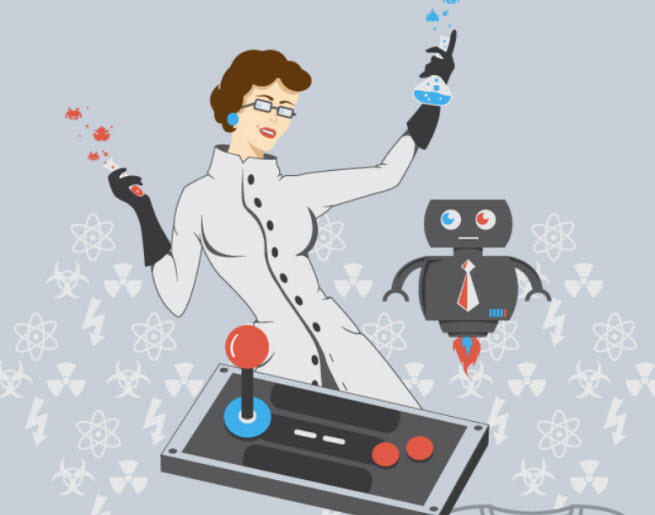In “What Games Are: The Scientism Delusion,” writer Tadhg Kelly argues that there is currently a fashion for “scientism” in today’s gaming industry. He states that developers and companies try to use “mystical formulas” to achieve success but that this approach rarely proves fruitful. He rails against those who espouse the use of analytics and mourns the death of gamemaking from a place of pure creativity rather than market-driven research.
I disagree. Instead of writing research off, we should take advantage of the way science and creativity work together to make games that players love. Use analysis to verify that what is fun for you is also fun for the player. This is the only way you will be successful in making a living doing what you are most passionate about.
A breakout hit such as Angry Birds stands out in our minds, but this is an exception, not the rule. In order to have any level of success, you must acknowledge trends and try to tap into areas with potential for growth rather than come up with an idea and hope for the best. My wife wants me to make a game that is set in a nursery where the goal is to keep eight babies clean, quiet, and happy at once. It would be called, creatively, The Baby Game.
You could be, as she is, very enthusiastic about this game, but to really evaluate it, you need to look beyond the idea and verify that there is a market of players for it. You need an audience and an income stream for it to be a real business. Kelly makes those of us who focus on the business side of gaming out to be cynics, but this is just real life.
So what should you be doing instead?
The best social-mobile studios use science to their advantage, analyze markets to find the new opportunities, and use playbooks as a foundation to make success repeatable.
Use scientific thinking as a competitive advantage
Passion is important. However, today studios must find out the features their players are most passionate about, not just their game designers. Social-mobile gaming companies have become successful because they use science to make fun games faster than their competitors.
Studios test hypotheses and adapt their products to provide the best player experience, eventually becoming masters of live operations. The reward is double-digit increases in engagement and monetization postlaunch. You see this in the evolution of games such as Tap Pet Hotel and Crime City. “Me too” competitors find it hard to keep up with a well-executing team.
So how do companies build on the success of an initial title to expand their business?
Analyze markets to find the next big thing
Developers should use category analysis to determine the ripest new markets. Kelly mentions Supercell as having luck and passion, but it was no coincidence they chose to make a game in the farming genre and saw great success with Hay Day.
Early on, we saw a lot of gaming outsiders get traction because they quickly took existing themes and mechanics and adapted them for mobile. What followed was a mapping of hits from other platforms to iOS and Android. For example: iMobsters is very similar to Mafia Wars, and Words With Friends is a new twist on the classic game of Scrabble.
As the mobile market becomes more competitive, ports of games will be less successful than games that take advantage of the unique characteristics of the new platform. CSR Racing is a fantastic example of success from taking the racing genre and adapting it to be simpler and “mobile first.”
Create playbooks to provide a foundation for innovation
 Over time, studios develop a body of knowledge that serves as a boilerplate they innovate on top of. This way, they are not always spending time building the fundamentals of a game from scratch and can focus their creativity on a smaller subset of new tests within the game.
Over time, studios develop a body of knowledge that serves as a boilerplate they innovate on top of. This way, they are not always spending time building the fundamentals of a game from scratch and can focus their creativity on a smaller subset of new tests within the game.
New massively multiplayer online games and role-playing games are built on systems that are similar to many games that came before them. Designers have playbooks of game mechanics in their head based on years of experience.
Companies should also create playbooks for important mobile systems such as virtual-goods stores and engagement techniques to save time and effort. Creativity works best when you give it constraints. Studio should spend time working on what makes their gameplay unique.
The reality is gaming is a difficult and competitive business. However, it is also an amazing blend of design, psychology, art, marketing, engineering, and operations. Top companies measure results and iterate on this body of knowledge to build better games. That is no scientism delusion. It’s the very definition of science.
[Image credit: Ashley Hay]
VentureBeat's mission is to be a digital town square for technical decision-makers to gain knowledge about transformative enterprise technology and transact. Learn More

